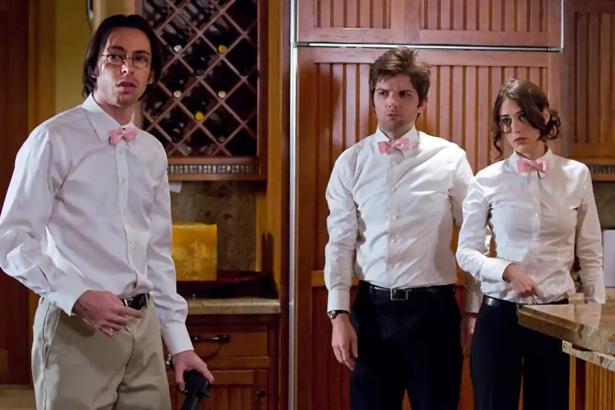tv Party Down: Charmingly Low-Budget Workplace Satire From the Makers of Veronica Mars
This dry, two-season comedy plays on the blurred boundaries between personal and professional life with an impressive ensemble cast
When we talk about the sitcoms of the late 2000s and early 2010s – The Office, Arrested Development, Parks and Recreation, 30 Rock – there’s one name that is consistently overlooked. Running for just two seasons on the US cable channel Starz from 2009 to 2010, Party Down is up there with the best of its contemporaries, bringing together an impressive ensemble cast to deliver a drily hilarious workplace satire.
Created by Paul Rudd and the minds behind Veronica Mars – Rob Thomas, John Enbom and Dan Etheridge – the charmingly low-budget show centres on a group of Hollywood caterers. Working for the eponymous catering company, they’re all creatives “slinging d’oeuvres” to make money on the side from their aspirational hustles, from acting to comedy to writing.
Except for Ron Donald (Ken Marino), the reformed party boy boss whose earnest dream is to manage a Soup R’ Crackers franchise – a fictional all-you-can-eat restaurant chain. His foil is Henry Pollard (Parks and Recreation’s Adam Scott), a failed actor whose biggest break was one line in a beer commercial that he’d rather forget. Eight years later, Henry has reluctantly returned to his old catering job. Scott’s straight-faced delivery is much of what makes Party Down such a delight – while he never directly breaks the fourth wall, there’s a knowing between character and audience that creates a mutual understanding of the absurdity of his situation.
Then there’s Casey Klein (Lizzy Caplan), a struggling, recently divorced comedian and Henry’s love interest; Kyle Bradway (Ryan Hansen), a handsome yet deeply unintelligent actor and musician; Constance Carmell (Jane Lynch), an older former actress who is still trying to live out the glory days; and Roman DeBeers (Martin Starr), a surly, pretentious “hard sci-fi” fan and screenwriter who personifies the modern incel.
In the second season, Lynch – who had by then left due to the success of her role in Glee – is replaced by the perennially wonderful Megan Mullally, whose portrayal of lovable ditz and aspiring stage mum Lydia Dunfree has more than a hint of her best-known character, Will and Grace’s Karen Walker.
The interactions of this motley crew – with the people at the parties they cater, from a Young Republicans event to a porn awards afterparty – are often surprising, revealing something new about the characters and the world they inhabit. Each episode focuses, mockumentary-style, on a single event, introducing the viewer to an array of entitled party guests who are never seen again. A bottle episode with actor Steve Guttenberg, in which he stages an impromptu writers’ workshop in his home, is particularly memorable for its complete ridiculousness.
The show never leaves the workplace. The complexities of these characters’ lives and relationships are teased out within the confines of their job, blurring the boundaries between personal and professional to create an almost claustrophobic intimacy. It’s also strangely prescient of the current, increasingly precarious gig economy, especially as Henry rises through the ranks and his priorities and attitudes begin to shift.
Party Down isn’t a perfect show. It was made in a time before conversations about diversity and sensitivity were common in the entertainment industry. It’s very white and some of its more irreverent jokes probably wouldn’t pass in a writers’ room in 2020. But it is raucously funny in a subtle way – its most brilliant moments are often in a glance or a pithy one-liner. Starr in particular shines – the Freaks and Geeks actor is a master of deadpan, and his intensely unlikable character is one of the best in the show.
During a cast reunion at the 2019 Vulture festival, Thomas quipped that he’d never seen viewership numbers as low as Party Down’s on network television. It’s a shame, because had it not been for the show’s premature cancellation, there could have been so many more parties to cater, so many more people to meet. But like every cult classic, it’s remembered for what it was, not what it could have become. The dead-eyed expressions of the actors as they bring out yet another plate of appetisers, pour yet another glass of champagne, echo the desperation of Henry’s infamous beer ad line: “Are we having fun yet?”


Spread the word